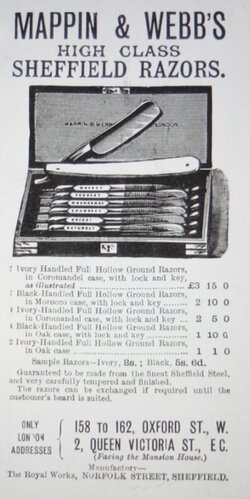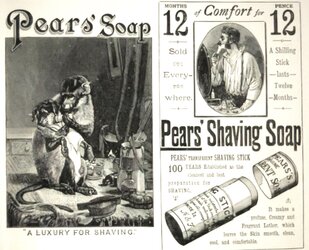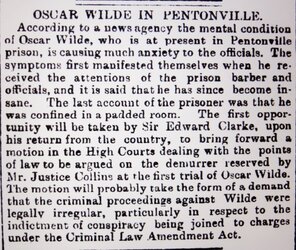I am a fan of Oscar Wilde (largely for his literary genius; note my avatar and quote in signature!), his impact on society, his writings, and so on. Some parts of his relatively short life were not glamorous nor upstanding (no comment on his sexuality preference or rumors), but he absolutely made an impact on more than literary circles, and his witty comments (within a split second according to some historians) are genius.
In any event, he lived from 1854-1900 (a lot in the London-area given his theatrical/playwright works), though he is known as an "Irish playwright" born in Ireland, spoke fluent English, German and French and so on. BUT WHAT DID OSCAR WILDE SHAVE WITH; he always looks so dapper!
My *guess* is a Wilkinson straight razor. Any other guesses? Wilkinson (makers of full length swords in England) started dabbling (then more) in razors during part of Wilde's lifetime (then the holy Wilkinson "Made in England" blades). So, a Wilkinson straight razor was probably readily available to him and he traveled with it likely (BEFORE TSA!). Dublin Shaving Co came on the scene in 1907 (officially--so after his death), but I wonder if they were involved in shaving even though their main business was related to sawmills(!). Perhaps they saw a need? Wilde certainly traveled plenty, so who knows.
Then again, mom-and-pop straight razor companies may have existed, but I like to believe Oscar Wilde was sporting a Wilkinson in his travel bag! Importance of Being Earnest (1895--a mere five years before his death at 46 years of age) is usually ranked #1 for his writings, but The Picture of Dorian Gray (written in 1890, five years before the previously mentioned work). Dorian Gray is eerie if you "read into it" and there was a decent remake on film of it that is chilling if you read the book first (roughly 300 pages in average font; the #1 is roughly 200 pages---I wonder if he simply became more succinct as time went on; digression).
Two of the more famous, flamboyant photos of him (did he use a Wilkinson before these photo shoots?) WHAT RAZOR DID HE USE?!


In any event, he lived from 1854-1900 (a lot in the London-area given his theatrical/playwright works), though he is known as an "Irish playwright" born in Ireland, spoke fluent English, German and French and so on. BUT WHAT DID OSCAR WILDE SHAVE WITH; he always looks so dapper!
My *guess* is a Wilkinson straight razor. Any other guesses? Wilkinson (makers of full length swords in England) started dabbling (then more) in razors during part of Wilde's lifetime (then the holy Wilkinson "Made in England" blades). So, a Wilkinson straight razor was probably readily available to him and he traveled with it likely (BEFORE TSA!). Dublin Shaving Co came on the scene in 1907 (officially--so after his death), but I wonder if they were involved in shaving even though their main business was related to sawmills(!). Perhaps they saw a need? Wilde certainly traveled plenty, so who knows.
Then again, mom-and-pop straight razor companies may have existed, but I like to believe Oscar Wilde was sporting a Wilkinson in his travel bag! Importance of Being Earnest (1895--a mere five years before his death at 46 years of age) is usually ranked #1 for his writings, but The Picture of Dorian Gray (written in 1890, five years before the previously mentioned work). Dorian Gray is eerie if you "read into it" and there was a decent remake on film of it that is chilling if you read the book first (roughly 300 pages in average font; the #1 is roughly 200 pages---I wonder if he simply became more succinct as time went on; digression).
Two of the more famous, flamboyant photos of him (did he use a Wilkinson before these photo shoots?) WHAT RAZOR DID HE USE?!






